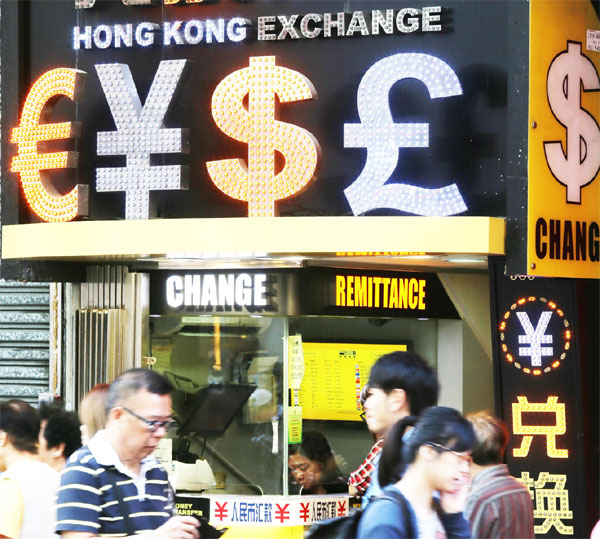Investment, trade to ride on falling yen
Updated: 2014-11-04 07:54
By Luo Weiteng in Hong Kong(HK Edition)
|
|||||||||
The Japanese yen fell to a seven-year low against the dollar on Monday after a surprised announcement by the Bank of Japan (BOJ) to increase stimulus by raising its monetary base target to 80 trillion yen ($0.71 trillion) annually.
"In the near future, the yen will continue to depreciate," said Raymond Yeung, senior economist at Australian and New Zealand Banking Group (ANZ). "BOJ's resolve to widen its stimulus has been vividly felt by the market. Investors have good reasons to expect BOJ to ramp up stimulus again on any similar occasion in the future."
Japan was Hong Kong's second-largest source of imports last year. In the first half of 2014, Hong Kong's imports from Japan increased by 4.4 percent from a year earlier to HK$138 billion.
Top on the list of Japanese imports include telecommunication equipment, office machines, consumer electronics and electrical appliances. The yen's slump is expected to benefit consumers by depressing Japanese import prices. But importers said they aren't rushing to stock up Japanese goods now because of the uncertainties on the currency front.
Simon Li, business development manager of a local professional IT services company, said his company has not placed new orders for Japanese electronics because he believes the yen will depreciate more. "We will consider purchases once we feel that the yen's exchange rate has stabilized," he said.
The depreciation of the yen could also make a major impact on bilateral trade between the Chinese mainland and Japan. A significant amount of that trade is routed through Hong Kong, traders said.
In the three years to 2013, the average annual growth rate for re-exports between Japan and the Chinese mainland through Hong Kong was 4 percent. But such re-exports fell by 9 percent last year to HK$289 billion due to depressed demand on the mainland.

"The yen's devaluation may boost the re-exports trade from Japan to the Chinese mainland through Hong Kong," said Yeung. "But given the weak domestic demand in the mainland market, I don't expect the trade growth to be considerable."
According to the National Bureau of Statistics, the official Purchasing Managers' Index eased to 50.8 in October from September's 51.1, showing a further decline in foreign and domestic demand.
"The yen's depreciation is a long-term trend because the market can see that BOJ has left some room for further expansion of the monetary base," said Dominic Wu, managing director of BNY Mellon Asia Pacific.
Due to the lack of investment opportunities in Japan's market and the less-attractive yields from Japanese equities, the depreciating yen could push Japanese investors, flushed with cash, to scout for investment opportunities in Hong Kong and emerging markets in Asia, including the Chinese mainland, said Wu.
The expected outflow of hot money from Japan is set to inflate asset prices in Hong Kong and other Asian economies, he said.
"These prospective Japanese investors will be lured by projected capital gain from their investment in Asian assets as well as foreign exchange windfalls arising from a weak yen," Wu said.
Meanwhile, travel agents in Hong Kong are rubbing their hands in glee as they expect more Hong Kong tourists to visit Japan during the upcoming Christmas holidays.
Ying Yuhua, who works at a bank in Central, said she has already exchanged HK$20,000 for the yen in preparation for her third trip to Japan this year.
A customer services executive at China Travel Service (Hong Kong) said more people were seeking information on tours to Japan following the yen's depreciation.
However, potential travelers should note that "the rising number of tourists from Hong Kong and other places is pushing up air-fare and accommodation costs, negating much the currency's advantage," she said.
"Travelers who want to watch the snow in Hokkaido during the Christmas holiday season can expect a 5 to 10-percent increase in costs," she added.
sophia@chinadailyhk.com
|
Hong Kong's trade sector could benefit from a weaker yen as Japan - the city's second-largest source of imports - adopts further monetary stimulus measures. The fluctuation of the yen remains uncertain amid a dim global economic outlook.?? Edmond Tang / China Daily |
(HK Edition 11/04/2014 page8)
